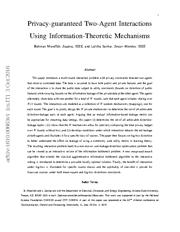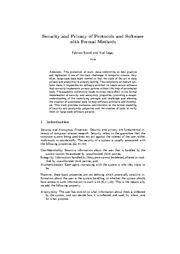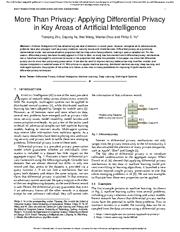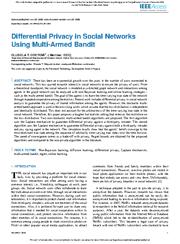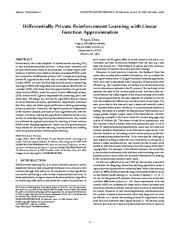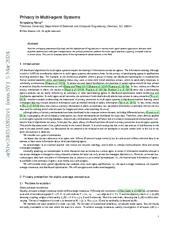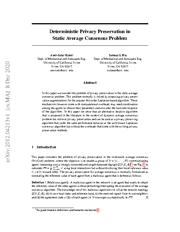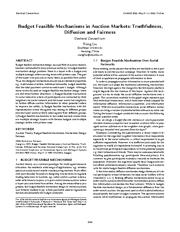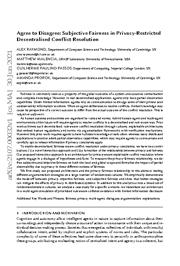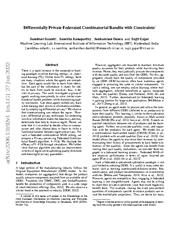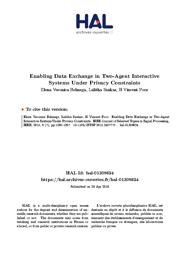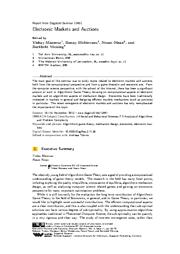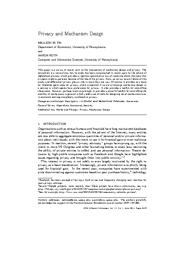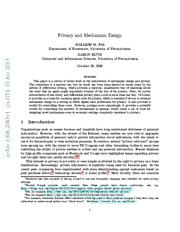A copy of this work was available on the public web and has been preserved in the Wayback Machine. The capture dates from 2019; you can also visit the original URL.
The file type is application/pdf.
Filters
Privacy-guaranteed Two-Agent Interactions Using Information-Theoretic Mechanisms
[article]
2016
arXiv
pre-print
This paper introduces a multi-round interaction problem with privacy constraints between two agents that observe correlated data. ...
the K mechanisms allow for precisely composing the total privacy budget over K rounds without loss; and (ii) develops conditions under which interaction reduces the net leakage at both agents and illustrates ...
CONCLUSION We have introduced and defined a K-round interactive privacy mechanism between two agents with correlated data. ...
arXiv:1610.00663v1
fatcat:nslaf5ggobgfjhwdqgzpee2mpy
Security and Privacy of Protocols and Software with Formal Methods
[chapter]
2016
Lecture Notes in Computer Science
Very often, large-scale data leaks remind us that the state of the art in data privacy and anonymity is severely lacking. ...
This is the reason why we add the following property: Anonymity The user has control on what information about them is collected by the system, and can decide how it is collected and used, by whom, and ...
Information-theoretical properties like non-interference [20, 39] can be used to prove that the communications of an agent do not leak information about the agent's secret information in any way, allowing ...
doi:10.1007/978-3-319-47166-2_61
fatcat:ygef2jw6dneabg7dgdskc26pz4
More Than Privacy: Applying Differential Privacy in Key Areas of Artificial Intelligence
[article]
2020
arXiv
pre-print
For this reason, differential privacy has been broadly applied in AI but to date, no study has documented which differential privacy mechanisms can or have been leveraged to overcome its issues or the ...
It can also be used to improve security, stabilize learning, build fair models, and impose composition in selected areas of AI. ...
Third, most of these papers involve agent interaction; and differential privacy is adopted to guarantee the privacy of interaction information. ...
arXiv:2008.01916v1
fatcat:ujmxv7eq6jcppndfu5shbzkdom
More Than Privacy: Applying Differential Privacy in Key Areas of Artificial Intelligence
2020
IEEE Transactions on Knowledge and Data Engineering
For this reason, differential privacy has been broadly applied in AI but to date, no study has documented which differential privacy mechanisms can or have been leveraged to overcome its issues or the ...
It can also be used to improve security, stabilize learning, build fair models, and impose composition in selected areas of AI. ...
Summary of multi-agent systems Third, most of these papers involve agent interaction; and differential privacy is adopted to guarantee the privacy of interaction information. ...
doi:10.1109/tkde.2020.3014246
fatcat:33rl6jxy5rgexpnuel5rvlkg5a
Differential Privacy in Social Networks Using Multi-Armed Bandit
2022
IEEE Access
Two non-stochastic multi-armed bandit algorithms are proposed. The first algorithm uses the Laplace mechanism to guarantee differential privacy against a third-party intruder. ...
The second algorithm uses the Laplace mechanism to guarantee differential privacy against both a third-party intruder and any spying agent in the network. ...
The first algorithm guaranteed differential privacy using the Laplace mechanism against a third-party intruder when there is no spy among the agents. ...
doi:10.1109/access.2022.3144084
fatcat:zchsdloe2bbyjhanklvnipcdei
Differentially Private Reinforcement Learning with Linear Function Approximation
2022
Abstract Proceedings of the 2022 ACM SIGMETRICS/IFIP PERFORMANCE Joint International Conference on Measurement and Modeling of Computer Systems
We design two private RL algorithms that are based on value iteration and policy optimization, respectively, and show that they enjoy sub-linear regret performance while guaranteeing privacy protection ...
Specifically, we consider MDPs with linear function approximation (in particular linear mixture MDPs) under the notion of joint differential privacy (JDP), where the RL agent is responsible for protecting ...
To this end, differential privacy (DP) [5] has become a standard mechanism for designing interactive learning algorithms under a rigorous privacy guarantee for individual data. ...
doi:10.1145/3489048.3522648
fatcat:pq4hpup2ovc4zhkwji3ve44qr4
Privacy in Multi-agent Systems
[article]
2024
arXiv
pre-print
With the increasing awareness of privacy and the deployment of legislations in various multi-agent system application domains such as power systems and intelligent transportation, the privacy protection ...
problem for multi-agent systems is gaining increased traction in recent years. ...
Information theoretic privacy undirected graph Gupta et al. (2019) Information theoretic privacy Nozari et al. (2017), He et al. (2018), Gao et al. (2018b), Wang et al. (2021a), Fiore and Russo (2019), ...
arXiv:2403.02631v1
fatcat:sidrwdancjb6tlhny26qbgmmbu
Deterministic Privacy Preservation in Static Average Consensus Problem
[article]
2020
arXiv
pre-print
These mechanisms however come with computational overhead, may need coordination among the agents to choose their parameters and also alter the transient response of the algorithm. ...
In this paper we show that an alternative iterative algorithm that is proposed in the literature in the context of dynamic average consensus problem has intrinsic privacy preservation and can be used as ...
Herein, we show that this mechanism has no contribution and the malicious agent can still derive local information asymptotically. ...
arXiv:2012.04213v1
fatcat:uc35e5mmvrcn5pjchgbziauat4
Budget Feasible Mechanisms in Auction Markets: Truthfulness, Diffusion and Fairness
2022
International Joint Conference on Autonomous Agents & Multiagent Systems
where the agents may belong to different groups and the buyer wants to fairly select agents from different groups; 3) Budget feasible mechanisms in two-sided markets where there are multiple strategic ...
neighbors via social network and the buyer wants her neighbors to further diffuse auction information to other potential sellers to improve her utility; 2) Budget feasible mechanisms with fair representation ...
The designed mechanism should determine an allocation and a payment scheme to guarantee various desired theoretical properties like, individual rationality that the payment to each seller covers at least ...
dblp:conf/atal/Liu22
fatcat:a3onsniy3japrnvsv7qrcanbfy
Agree to Disagree: Subjective Fairness in Privacy-Restricted Decentralised Conflict Resolution
[article]
2021
arXiv
pre-print
To enable decentralised, fairness-aware conflict resolution under privacy constraints, we have two contributions: (1) a novel interaction approach and (2) a formalism of the relationship between privacy ...
Our proposed interaction approach is an architecture for privacy-aware explainable conflict resolution where agents engage in a dialogue of hypotheses and facts. ...
If the agents lack full information, there cannot be any guarantee of an objectively fair outcome. ...
arXiv:2107.00032v1
fatcat:rbuaarzjzjenxkq4ohu72vowpy
Differentially Private Federated Combinatorial Bandits with Constraints
[article]
2022
arXiv
pre-print
Each agent would like to learn from others, but the part of the information it shares for others to learn from could be sensitive; thus, it desires its privacy. ...
Can these agents collectively learn while keeping their sensitive information confidential by employing differential privacy? We observe that communicating can reduce the regret. ...
P-FCB includes selecting the information that needs to be perturbed and defining communication rounds to provide strong privacy guarantees. ...
arXiv:2206.13192v1
fatcat:fhhofpgkcncmha7rra2gwhwxpa
Enabling Data Exchange in Two-Agent Interactive Systems Under Privacy Constraints
2015
IEEE Journal on Selected Topics in Signal Processing
This paper builds upon a recent information-theoretic result (using mutual information to measure privacy and mean-squared error to measure fidelity) that quantifies the region of achievable distortion-leakage ...
tuples in a two-agent network. ...
The competitive privacy information-theoretic framework introduced in [3] studies information exchange among two interconnected agents whose privacy concerns limit such data sharing, and thus, impacts ...
doi:10.1109/jstsp.2015.2427775
fatcat:q2x6eckknbdsvlyhvpd7jkmahy
Electronic Markets and Auctions (Dagstuhl Seminar 13461)
2014
Dagstuhl Reports
The main goal of this seminar was to study topics related to electronic markets and auctions both from the computational perspective and from a game-theoretic and economic one. ...
Economics have been traditionally interested in markets in general and designing efficient markets mechanisms (such as auctions) in particular. ...
The information revealed by the principal affects the incentives of the agents to explore and generate new information. ...
doi:10.4230/dagrep.3.11.58
dblp:journals/dagstuhl-reports/MansourMNV13
fatcat:yvkfyeeezrhhnhckygpqseqwx4
Privacy and mechanism design
2013
ACM SIGecom Exchanges
Of course, it provides us a basis for modeling agent costs for privacy, which is essential if we are to attempt mechanism design in a setting in which agents have preferences for privacy. ...
an agent might experience because of the loss of his privacy. ...
., that private information can be used to price discriminate against an agent, and therefore privacy is "good" for an agent, is not reflected in models where information is revealed by strategic purchases ...
doi:10.1145/2509013.2509016
fatcat:m5hvdv2pg5gfvbfs2gknjzpasq
Privacy and Mechanism Design
[article]
2013
arXiv
pre-print
Of course, it provides us a basis for modeling agent costs for privacy, which is essential if we are to attempt mechanism design in a setting in which agents have preferences for privacy. ...
an agent might experience because of the loss of his privacy. ...
How should we model privacy costs that are not captured by information theoretic measures like differential privacy, but nevertheless seem to have real economic consequences? ...
arXiv:1306.2083v1
fatcat:rpgbfnwaljeknjhjivwcrldnzm
« Previous
Showing results 1 — 15 out of 25,744 results

